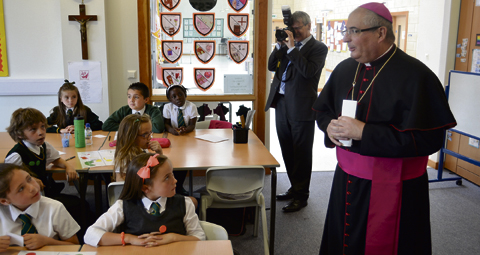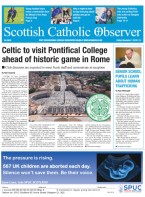February 6 | ![]() 0 COMMENTS
0 COMMENTS ![]() print
print

Stakeholders in Catholic education
ARCHBISHOP PHILIP TARTAGLIA, president of the CATHOLIC EDUCATION COMMISSION, recognises the gift of Catholic education in Scotland, and highlights possible improvements
Esztergom, near Budapest, in Hungary. In discussion, one of the bishops from another European country lamented the fact that the Church in his country could not access schools to contribute to the religious formation of children and young people.
I thought how fortunate we were in Scotland to have a public provision of schools for the Catholic community, a public provision which is guaranteed by law, in which the Church is an integral part of the life of the school community.
People often say that the ethos and atmosphere of a Catholic school contributes positively to the nurture and growth of young people, favouring their engagement with their education at school and helping them to take their place in society as mature, responsible and socially aware young people. This is no accident. When the person of Jesus Christ is at the centre of a school community, when children and young people are introduced to the study of their faith in a systematic and graduated way through an RE syllabus which is approved by their bishops, when they can pray and worship with the school community and during the school day, everyone benefits: the children and young people themselves, their teachers, their families and wider society.
The Catholic Church in Scotland is pleased to be stakeholders in Catholic schools and is committed to these schools. In this Catholic Education Week, I call on the whole Catholic community to continue to be supportive stakeholders in Catholic education. The bishops, with our excellent Scottish Catholic Education Service, can defend Catholic schools from attacks from the usual suspects. But we cannot defend them from the apathy and lack of interest of the Catholic community. As far as I can see, there is no real sign of that, thank God. There seems to be a generally shared assessment that Catholic schools are good for our children and young people, good for the Catholic community, and good for Scotland.
However, Catholic Education Week cannot simply be about congratulating ourselves on the good performance of Catholic schools. It needs to be also about improvement and ever higher quality. Here is a seven-point plan, which I think would help to make Catholic schools even better:
—More Catholic teachers: we need to encourage more young Catholic men and women into the teaching profession;
—Teachers who live their Faith joyfully and fully: even better religious formation and education of student teachers;
—Even better engagement with and delivery of the RE curriculum —This is our Faith—within the school;
—A seamless commitment to the practice of the faith across family, parish and school;
—Parents and Parent Councils who take a special interest in the effectiveness of the RE Syllabus and in the spiritual life of the school;
—Support for Catholic teachers: more in-service opportunities for teachers to deepen their Faith and their ability to teach the RE syllabus;
—Good relations between the Church and local authorities/government in the implementation of educational policy.
In the end, Catholic schools can only be justified and achieve their mission if the person of Jesus lights up the school through the Faith and love of teachers and pupils, and through the active support of parents and families who want the school to succeed precisely as a Catholic school. So during Catholic Education Week we should thank God for Catholic education in Scotland and pray for its continued success and improvement.
—Archbishop Philip Tartaglia of Glasgow is president of the Department for Catholic Education of the Bishops’ Conference of Scotland, and president of the Bishops’ Conference of Scotland
PIC: GERARD GOUGH










